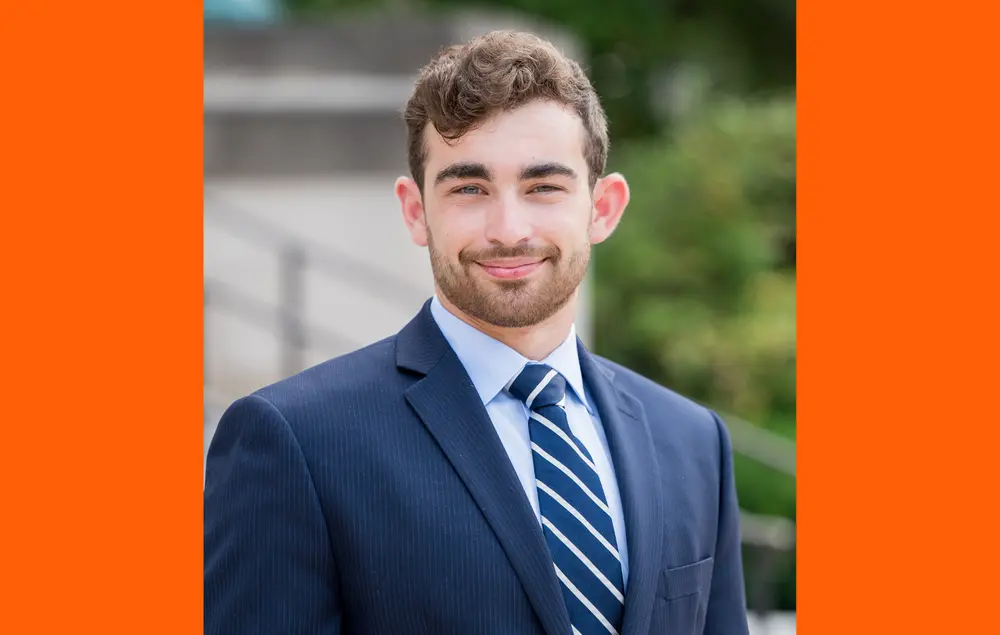
Adding to the continued success of our School of Molecular & Cellular Biology students, biochemistry major Ben Shapiro was recently selected for the University of Illinois Urbana-Champaign 2024 Homecoming Court. Congratulations!
We sat down with him to discuss his experiences at Illinois and learn about his plans for the future.
At Illinois, Shapiro is president of Illini Hillel, serves as the Senior Advisor (formerly VP) of the Bioscience Journal Club, and works as an MCB Peer Advisor. During his time at U. of I., he has worked as an Emerson Fellow at StandWithUs, an ambassador at Carle Foundation Hospital, and a member of the Provost Student Board. Shapiro is grateful to have had so many great experiences at Illinois and is honored to have been selected as part of this year’s homecoming court.
What led you to study at Illinois?
Ben Shapiro: In high school, I always thought my first choice for college would be the University of Michigan. My aunt and uncle went there, and I grew up a huge Wolverine fan. When I was 15, I attended UMich's swim camp and spent two weeks living in the dorms with friends. As a senior, I applied to Michigan, Indiana, Illinois, and a few other Big Ten schools. Although I was fortunate to be accepted, financial considerations led my parents and me to weigh all our options carefully. Ultimately, I chose to follow in my mom’s footsteps and attend the University of Illinois. Initially, I was hesitant about staying in-state, but coming to Illinois has proven to be one of the best decisions I’ve made. I’ve built lasting friendships and found a strong balance between my social life, academics, and community engagement.
Why did you decide to study biochemistry?
I knew early in high school that I wanted to pursue a career in medicine. More specifically, I wanted a profession where I could go to bed every night knowing I made a real impact in people’s lives. Being naturally curious, I enjoy asking questions and exploring new ideas. I also love working with people and understanding the unique challenges they face. Medicine fascinates me because it involves identifying problems, determining treatment options, and communicating complex information in a way patients can understand.
Once I decided medicine was my goal, I mapped out the steps to get there. I quickly realized that to truly understand medicine, you have to understand life at its smallest scale—how cells and molecules function. Although challenging, courses like AP Biology and AP Chemistry sparked my excitement. I wanted to delve into human biology at a molecular and chemical level, and biochemistry seemed to offer the perfect tools for that. It helps explain how chemical reactions occur, how factors like temperature, pressure, and energy influence these reactions, as well as how to model them mathematically.
A strong foundation in biochemistry is also essential for research, particularly in areas like drug discovery. I realized that while being a physician allows you to impact thousands of patients, being a researcher gives you the potential to reach millions by contributing to the development of new treatment options. This realization solidified my passion for biochemistry.
Can you share more about your experiences in Dr. Jefferson Chan’s Lab?
Our lab specializes in photodynamic therapy. In my project, we design, synthesize, and test organic compounds—a drug—that we expose to near-infrared light. This light triggers a chemical change in the drug, enabling it to selectively kill tumor cells without harming the surrounding healthy cells. Our goal is to develop drugs that are truly cancer-specific, unlike traditional treatments such as chemotherapy. Many people believe chemotherapy targets cancer specifically, but it actually kills all fast-replicating cells, including hair and stomach lining cells, which leads to side effects like nausea and hair loss.
The drugs we’re developing aim to not only treat tumors but also provide diagnostic information, allowing us to locate tumors and eliminate them without damaging healthy tissue. I’m fortunate to be part of an incredible team and have a great mentor who guides me through the process. Last winter, we published [a paper on a new cancer drug] that showed promising results in mice. It’s been an incredibly exciting and rewarding experience.
What are you most excited about as you begin medical school and your future career?
I’m really excited about the opportunity to work with a wide range of patients and hear their stories and challenges. Medicine has so many dimensions, but two aspects I’m most passionate about are understanding a person’s background and their unique lived experiences. For example, are they from a rural agricultural area or an urban city? What does their job entail? Is it causing them stress, and how might that contribute to their illness?
The diagnostic process is another aspect I love. It’s like solving a mystery: the patient presents with symptoms, and it’s your job to figure out what’s wrong. You identify the symptoms, run tests, and analyze the results to arrive at a diagnosis. The problem-solving aspect of medicine is really exciting. Once you diagnose the issue, you move on to treatment options. I’ve come to realize that there are rarely perfect solutions, and they almost always involve some level of trade-offs. Few treatments solve a problem without introducing new challenges. It’s essential to guide patients through their choices, helping them understand the implications and find the best fit for their lifestyle.
Are you worried that your career might be overwhelming or too much to handle?
If you start something and it doesn’t scare you a little, it’s probably not challenging enough. New experiences can feel overwhelming at first, but that’s what pushes you to keep learning and growing. More than anything, I want a career that constantly challenges me—with new cases, new technology, and new stories.